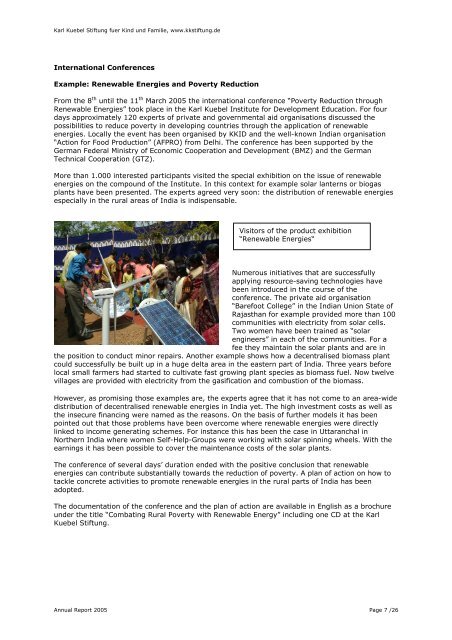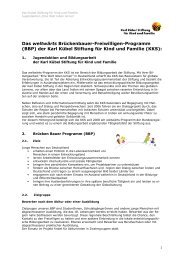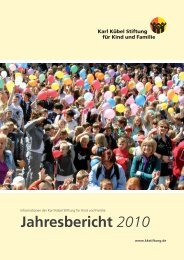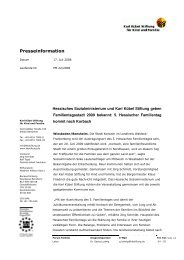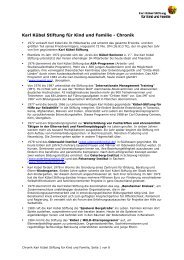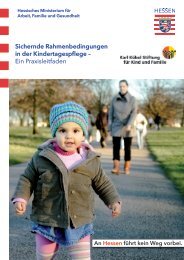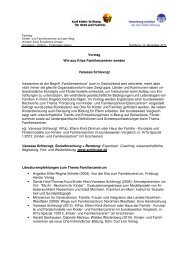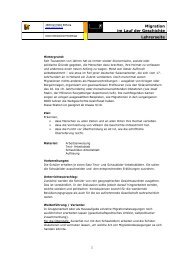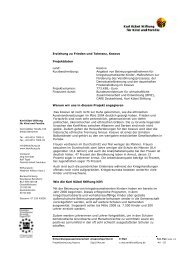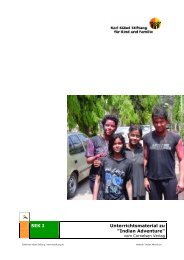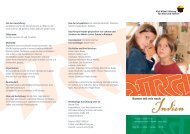Annual report-2005 - Karl Kübel Stiftung
Annual report-2005 - Karl Kübel Stiftung
Annual report-2005 - Karl Kübel Stiftung
You also want an ePaper? Increase the reach of your titles
YUMPU automatically turns print PDFs into web optimized ePapers that Google loves.
<strong>Karl</strong> Kuebel <strong>Stiftung</strong> fuer Kind und Familie, www.kkstiftung.de<br />
International Conferences<br />
Example: Renewable Energies and Poverty Reduction<br />
From the 8 th until the 11 th March <strong>2005</strong> the international conference “Poverty Reduction through<br />
Renewable Energies” took place in the <strong>Karl</strong> Kuebel Institute for Development Education. For four<br />
days approximately 120 experts of private and governmental aid organisations discussed the<br />
possibilities to reduce poverty in developing countries through the application of renewable<br />
energies. Locally the event has been organised by KKID and the well-known Indian organisation<br />
“Action for Food Production” (AFPRO) from Delhi. The conference has been supported by the<br />
German Federal Ministry of Economic Cooperation and Development (BMZ) and the German<br />
Technical Cooperation (GTZ).<br />
More than 1.000 interested participants visited the special exhibition on the issue of renewable<br />
energies on the compound of the Institute. In this context for example solar lanterns or biogas<br />
plants have been presented. The experts agreed very soon: the distribution of renewable energies<br />
especially in the rural areas of India is indispensable.<br />
Visitors of the product exhibition<br />
“Renewable Energies“<br />
Numerous initiatives that are successfully<br />
applying resource-saving technologies have<br />
been introduced in the course of the<br />
conference. The private aid organisation<br />
“Barefoot College” in the Indian Union State of<br />
Rajasthan for example provided more than 100<br />
communities with electricity from solar cells.<br />
Two women have been trained as “solar<br />
engineers” in each of the communities. For a<br />
fee they maintain the solar plants and are in<br />
the position to conduct minor repairs. Another example shows how a decentralised biomass plant<br />
could successfully be built up in a huge delta area in the eastern part of India. Three years before<br />
local small farmers had started to cultivate fast growing plant species as biomass fuel. Now twelve<br />
villages are provided with electricity from the gasification and combustion of the biomass.<br />
However, as promising those examples are, the experts agree that it has not come to an area-wide<br />
distribution of decentralised renewable energies in India yet. The high investment costs as well as<br />
the insecure financing were named as the reasons. On the basis of further models it has been<br />
pointed out that those problems have been overcome where renewable energies were directly<br />
linked to income generating schemes. For instance this has been the case in Uttaranchal in<br />
Northern India where women Self-Help-Groups were working with solar spinning wheels. With the<br />
earnings it has been possible to cover the maintenance costs of the solar plants.<br />
The conference of several days’ duration ended with the positive conclusion that renewable<br />
energies can contribute substantially towards the reduction of poverty. A plan of action on how to<br />
tackle concrete activities to promote renewable energies in the rural parts of India has been<br />
adopted.<br />
The documentation of the conference and the plan of action are available in English as a brochure<br />
under the title “Combating Rural Poverty with Renewable Energy” including one CD at the <strong>Karl</strong><br />
Kuebel <strong>Stiftung</strong>.<br />
<strong>Annual</strong> Report <strong>2005</strong> Page 7 /26


